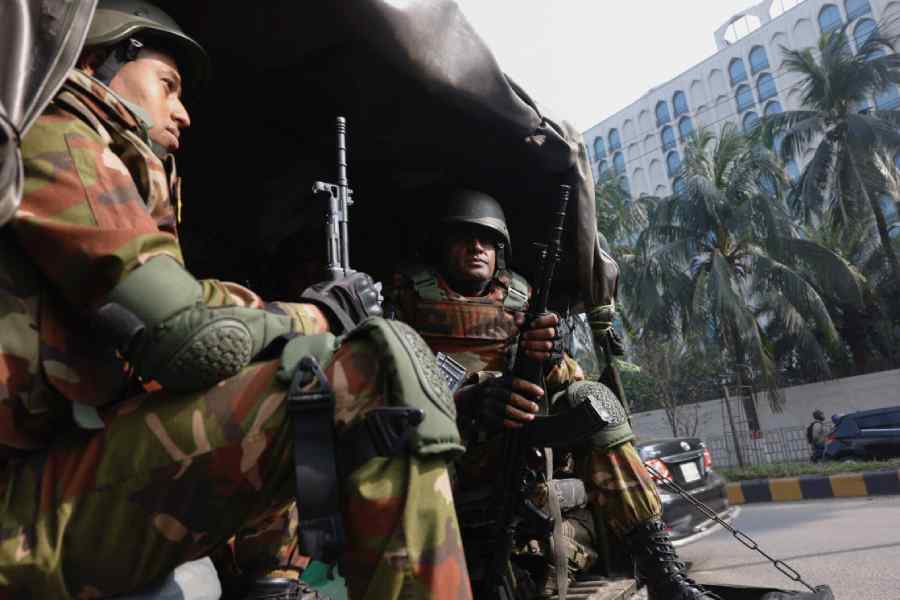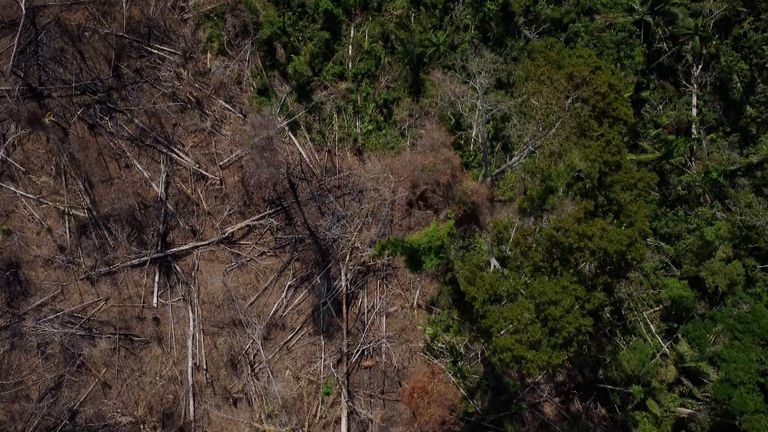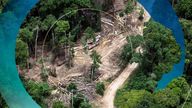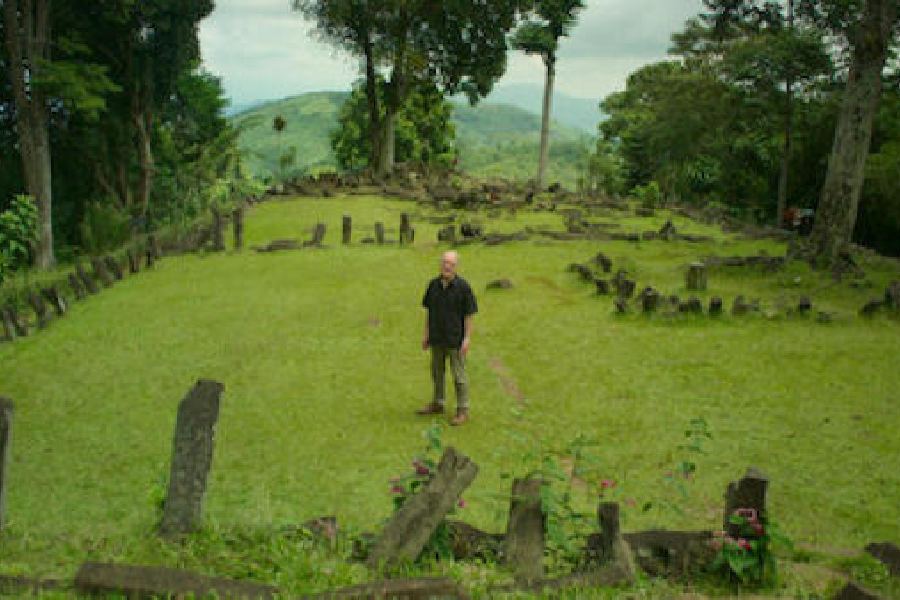Ode to the father: Bangladesh’s political personality cult
By AFPJanuary 3, 2024

Once sidelined from official history, Sheikh Mujibur Rahman is now the subject of a personality cult that designates him 'Father of the Nation' - Copyright AFP Munir UZ ZAMAN
Bangladeshi Prime Minister Sheikh Hasina still grieves the assassination of her father — the country’s founder — nearly 50 years ago, and her government ensures the nation grieves with her.
Once sidelined from official history, Sheikh Mujibur Rahman is now the subject of a personality cult that designates him “Father of the Nation”.
Hasina has foregrounded his legacy in what critics say is an effort to entrench her ruling Awami League, which dominates national politics and is set to sweep elections Sunday following an opposition boycott.
Her government has also enacted stiff punishments for any comments, written work or social media posts that could be construed as defaming his legacy.
“She has basically introduced a secular blasphemy law in the country for her father — the kind we see in one-party states,” a senior human rights activist in Bangladesh told AFP, asking for anonymity out of fear of retribution.
Since his daughter returned to office in 2009, Mujib’s visage has appeared on every banknote and in hundreds of public murals across the South Asian nation of 170 million people.
Dozens of roads and institutes of higher learning have been named after him, and Hasina’s government changed the constitution to require that his portrait be hung in every school, government office and diplomatic mission.
At the centre of this project of national commemoration is Hasina’s childhood home in an upmarket neighbourhood of the capital Dhaka.
Now a museum, the residence is where her father, uncle and three brothers were gunned down by disgruntled army officers at the break of dawn in August 1975.
The walls are still pockmarked with bullet holes from that day, in rooms that otherwise faithfully preserve the books, smoking pipe and other artefacts of Mujib’s life, with hundreds visiting daily to pay their respects.
“I could see how he and his family were brutally murdered,” student Abdur Rahim ibne Iftekhar, 21, told AFP inside. “It was heart-wrenching.”
– ‘Betrayal of the hopes’ –
Mujib was the key political figure during a period of growing agitation for independence from Pakistan, which had governed the territory now known as Bangladesh since the 1947 end of British colonial rule.
He was imprisoned by Pakistan’s military regime at the outset of a horrific 1971 war that liberated his country and killed as many as three million people — most of them civilians in present-day Bangladesh.
Mujib was the first post-independence leader but the tumultuous years that followed saw Bangladesh struggle through the economic devastation imposed by the war, including a famine in which hundreds of thousands of people died.
Towards the end of his life he abolished multi-party democracy and imposed media restrictions that shuttered all but four state-controlled newspapers.
Hasina refers to his assassination in a 1975 military coup in almost every speech she gives, her voice often choking with emotion.
It was “the betrayal of the hopes and aspirations of the people of the soil”, she once wrote.
– ‘Cannot be questioned’ –
In 2018, Hasina’s government enacted a cybersecurity law that has been used to arrest numerous people accused of defaming Mujib’s legacy.
A city mayor from her party was arrested in 2021 for refusing to approve a mural of Mujib, because the traditions of some among Bangladesh’s majority Muslim faith consider depictions of people in murals or statues to be idolatry.
Opposition parties say that the veneration of Mujib and the laws protecting him from criticism reflect a broader erosion of civil liberties under Hasina and the consolidation of her party’s grip over democratic institutions.
“It is a clear tilt towards an authoritarian one-party state,” a senior opposition official, who also asked for anonymity, told AFP.
Some analysts believe Hasina’s motivations to be more personal.
Mujib’s contributions to Bangladesh’s independence struggle were minimised by the military government that replaced him.
Some of his killers received coveted diplomatic postings and all were controversially indemnified from prosecution — a law revoked by Hasina’s government.
All five were hanged after she returned to office.
“Hasina wants to make sure that this and future generations do not encounter such a situation,” Ali Riaz, a professor at Illinois State University, told AFP.
“The objective is to ensure that Sheikh Mujib’s standing and contributions in history cannot be questioned.”
Bangladesh polls 2024: Scent of an election foretold
Out of 44 registered political parties in Bangladesh, around 29 are in the fray. Voters will choose from among 2,800 candidates to elect 300 MPs to Parliament
Devadeep Purohit
Dhaka
Telegraph Calcutta
Published 04.01.24

Members of the Bangladesh Army arrive at a temporary camp in Dhaka on Wednesday after the army was deployed across the country to help the civil administration during the general election. Sourced by the Telegraph.
What’s the point of covering this election, the co-passenger on the Calcutta-Dhaka flight asked.
Flying time of 30 minutes does not allow scope for a meaningful conversation. The chatty businessman from Dhaka’s upscale Nikunja area, however, had a lot to
talk about — from his passion for cricket to his love of Calcutta’s cuisine. The Bangladesh elections — scheduled on January 7 — came in a bit late into the conversation when he learnt why this correspondent was travelling to Bangladesh.
“Everyone is aware of the outcome and so there is no interest.... You certainly don’t need to be in Bangladesh to know that Sheikh Hasina is returning to power,” he smirked, the comment coinciding with the crackle from the cockpit that the flight had landed at Hazrat Shahjalal International Airport in Dhaka.
The conversation ended abruptly as he rushed to the immigration counter for a faster exit from the airport.
Out of 44 regitered political parties in Bangladesh, around 29 are in the fray. Voters will choose from among 2,800 candidates to elect 300 MPs to Parliament. But since the main Opposition force, the Bangladesh Nationalist Party, is not participating in the election, the Hasina-led Awami League is all set to form the government for the fourth consecutive term. The BNP had stayed away in 2014 too and contested half-heartedly in 2018. The party and its allies are boycotting the polls this time because their main demands for elections under a caretaker government and the resignation of Hasina have not been met. They are also trying to influence the citizens to stay away from the booths. Given the track record of the BNP, which enjoys the support of Jamaat-e-Islami, in inflicting violence to press for its demands, there is fear in the air about the polls.
What met the eye
The scenes at the airports — both in Calcutta and Dhaka — however did not suggest a lack of interest in the elections.
“It seems all Bangladeshis, who were in Calcutta for shopping or medical reasons, are rushing back to the country for the polls…. This morning I saw people checking out from the hotel in droves,” a businessman from Old Dhaka said, referring to the scenes he witnessed at a Sudder Street hotel.
Most Bangladeshi tourists prefer staying at hotels in the Free School Street, Marquis Street or Sudder Street areas of Calcutta.
The scent of an election hung heavy on the Hazrat Shahjalal International Airport as scores of international journalists and observers were seen crowding at the temporary help desk set up by the poll panel.
The leading newspapers were full of reports on poll-related clashes, deployment of armed forces across the country from Wednesday, and claims and counter-claims of the ruling party, its dissidents and the Opposition.
Although the BNP has decided to stay away from the polls and a majority of its top leaders are behind bars on various charges, all the prominent newspapers carried reports on the party’s outreach programmes to convince people to boycott the elections.
Election-related reports and talk shows make up more than 90 per cent of the content on audio-visual and digital platforms, said the editor of a television network.
“People have an insatiable appetite for poll-related news and we are trying our best to meet the demand,” said the editor.
Poll-bound Dhaka looked uncannily like Indian cities in the run-up to elections as giant cut-outs of candidates and their campaign material could be spotted here, there and everywhere.
Needless to say, a smiling Hasina eclipsed all other faces across the length and breadth of Dhaka.
Participatory or not
Most discussions in Bangladesh ahead of Sunday’s polls revolved around one main theme — is it a participatory and inclusive election?
This question cannot be wished away as the Awami League dissidents — more than 200 of them are in the fray against the party’s official nominees — have emerged as the main Opposition in the poll battle in the absence of the BNP.
Jatiya Party, which claims to be an Opposition party, is in the running, but as the Awami League has left the field vacant in 26-odd seats, very few people in Bangladesh consider it an Opposition party.
Hasina has also left six seats for a 14-party alliance that includes fringe Left forces like the Workers’ Party.
Against this backdrop, the BNP has launched a campaign to decry the polls, calling them a “sham” and a direct assault on democracy. A section of the civil society is echoing the argument.
“This cannot be called an election as the main Opposition party is not contesting.... The ruling party is trying to create a competitive charade by donating some seats to some smaller parties.
Most of the so-called dissidents of the ruling party are also fielded as part of a larger plan to make the polls look participatory,” said a young professional working with an international agency. He requested anonymity.
There is, however, a counterargument as several people in Bangladesh — sharply divided along the Awami League and anti-Awami League binary — are asking what prevented the BNP from participating.
While the last 15 years under Hasina have produced stellar development fruits for Bangladesh which has emerged as one of the strongest economic forces in this region, it is also true that she faces the challenge of anti-incumbency because of high inflation, depleted foreign exchange reserves and lack of employment opportunities for educated youth.
Several Western countries, including the US, have also raised questions about the lack of media freedom and human rights violations.
Some observers feel that the BNP — crippled by the prolonged illness and incarceration of its chairperson and former Prime Minister Begum Khaleda Zia and the absence of her son Tareq Rehman, who is in exile in London for over 15 years — squandered its prospects by choosing not to exploit the situation.
Several BNP insiders have been saying in private for years that staying away from the polls in 2014 and putting up only a half-hearted fight in 2018 — the party withdrew its candidates from most constituencies on poll day citing electoral malpractice — have caused irreparable damage to the party’s organisational strength.
Several anti-Awami League sections of Bangladesh agree that the BNP’s decision of staying away from the polls and banking heavily on the US — to ensure fulfilment of its demands or countermanding of the elections — cannot be justified.
Elephant in the room
On Wednesday, Hasina said the January 7 national election would be free, fair and neutral and would become a milestone in the country’s democratic history.
“People will cast votes for their favourite candidates and make them victorious. That is our target,” she said with resounding confidence.
This confidence — in the backdrop of the biggest Opposition party’s resistance to polls and reports on the US’s apparent support to the anti-Awami League forces — veered the discussions towards the elephant in the room: India.
A topic that the garrulous businessmen avoided deftly by shying away from any comments on how Hasina is able to push through the polls has been brought to the centre-stage by some BNP politicians.
“The Indian government’s support for Sheikh Hasina is deeply mysterious and politically motivated.... The Indian government has made the people of Bangladesh its opponent.
“However, the people of Bangladesh consider their Indian fellows friendly,” BNP senior joint secretary-general Ruhul Kabir Rizvi said during a virtual media briefing.
“Our nearest neighbour is India, which is a democratic country. How does the Indian government support an undemocratic administration?” he asked.
While the Indian foreign ministry establishment has repeatedly stated — contrary to the US which tried to push for a caretaker government and Hasina’s resignation — that the election is an internal matter of Bangladesh, the BNP has tried to propagate its hypothesis on India’s support for Hasina.
“Show one instance wherein we tried to influence the poll process or advocated support for any party this time.... We have stated that we want a free and fair poll as per the constitutional provisions in Bangladesh,” said a senior official in the Indian security establishment.
Multiple sources said that the BNP leadership had approached New Delhi — some of its leaders had flown to the Indian capital — seeking its support.
“Bangladesh is a very important neighbour and India wants a stable, democratic and development-oriented government there.... But it’s for Bangladeshis to elect the government they want,” said another source.
A strategic affairs expert said that the reality is much more complex than what the BNP has alleged or what the Indian side has publicly stated.
“Bangladesh is very strategic for India because of its close proximity.... Electoral outcomes in Bangladesh will surely have a bearing on India.
Given the track record of the BNP between 2001 and 2006, when they supported and aided Indian insurgent groups, New Delhi will always have trust issues with them. One should also not forget that their main ally is Jamaat-e-Islami, which is a stated anti-India force,” said the expert.









 A portion of boreal forest in northern Quebec. A study found that commercial logging in Quebec and neighboring Ontario has caused the removal of 35.4 million acres of forest. Credit...Renaud Philippe for The New York Times
A portion of boreal forest in northern Quebec. A study found that commercial logging in Quebec and neighboring Ontario has caused the removal of 35.4 million acres of forest. Credit...Renaud Philippe for The New York Times








